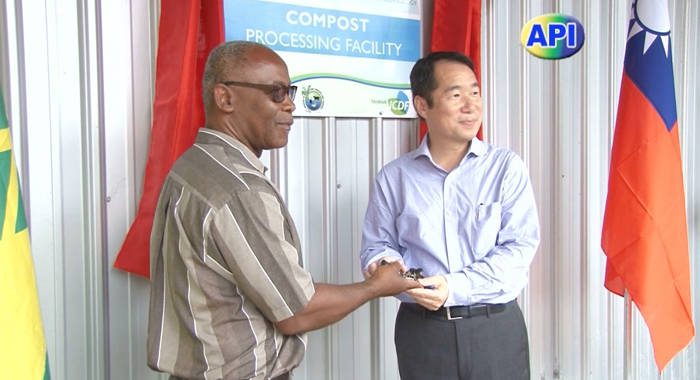Farmers in St. Vincent and the Grenadines now have the alternative to
The compost facility is a joint collaboration between the Governments of Taiwan and St. Vincent and the Grenadines and is part of a larger project entitled “Strengthening Farmer’s Organisation and Improving Fruit and Vegetable Production Technology in St. Vincent and the Grenadines”.
The project includes the establishment of eight farmers’ cooperatives, which produce various agricultural commodities; training of farmers and extension officers to strengthen their capacity to aid in the improved management of cooperative organisations; soil sample collection; analysis and fertiliser recommendations; the procurement of equipment; and the outfitting of the probiotics laboratory.
Construction cost of the compost facility was EC$1.5 million.
It is equipped with three bio-digesters, a steam sterilising machine, and other inputs for vegetable seedling production. The project was executed over a four-year period at a cost of EC$7,273,832.
Addressing the handing over ceremony, Marcus Richards, senior agricultural officer with responsibility for extension and advisory services, described the compost facility as another fruit of the excellent collaboration between Taiwan and SVG.
Chief Agricultural Officer, Ashley Cain, said SVG’s agricultural sector is better and stronger because of Taiwan’s assistance.
Cain expressed gratitude to the Government of Taiwan for its assistance and advised all stakeholders to make use of the support from “our friends”.
According to Cain, agriculture in SVG has great potential and he commended Minister of Agriculture, Saboto Caesar’s leadership, adding that with his “leadership we can go far”.
The chief agricultural officer shared a concern that he has where older persons are leaving the agricultural industry at a higher rate than it is being replenished by younger persons.
Cain noted that this can present a challenge in the near future and stressed the need to engage youths.
Taiwan Ambassador to SVG, Calvin Ho, said he is pleased that his government was able to collaborate with SVG on yet another project.
Ho stated that the two governments have worked closely together on agriculture over the years.
The ambassador disclosed that with the new equipment, 552 soil sample tests have been conducted and 6 metric tonnes of bio-fuel produced.
The project also covered training for eight agriculture officers in Taiwan under the International Cooperation and Development Fund (IDCF). Ambassador
Ho said more projects will be carried out in the future and they will continue to work with the Ministry of Agriculture to make SVG one of the best agricultural nations in the region.
Meanwhile, Caesar thanked Taiwan for its contribution to SVG.
The agriculture minister Caesar said that when the agricultural history is written in SVG, Taiwan will be featured prominently.
Caesar used the opportunity to highlight health risks associated with chemicals used in the agricultural sector.
He said the ultimate goal is not only to ensure that Vincentians have a constant food supply but that the food consumed is safe.
In light of this, Caesar disclosed that his ministry will be taking serious steps to curtail the importation of foods with high pesticide contents.
He announced that heightened surveillance of imported commodities will be introduced in the first quarter of 2019.







Anything that would enhance our agricultural productivity and competitiveness is welcome since farming remains the only area where there is lots of potential for economic growth on the mainland.
Still, much of the organic farming movement is pure hype and scam: (1) nearly all noxious chemicals are either filtered out by the plants themselves during the growing process or would lead to the plants’ death long before it reached the stage of human consumption; (2) organic foods are much more expensive; and (3) genetically modified organisms (GMOs) are unfairly denigrated by organic farming boasters (https://rationalwiki.org/wiki/Organic_food; https://www.hoover.org/research/organic-food-hoax).
Organic foods are big sellers in Canada, and organic foods aren’t nutritionally any better per se. But if you are pregnant or nursing a child, why take the risk of residual chemicals that might harm your child? I like growing things so I had a thousand sq ft of organic vegetables in a community garden. It was fun, but it became difficult giving away my produce. I took my surplus to the local food bank, which gives food free to poor people. We weren’t allowed to sell our produce for profit. Reality is very different here. My garden plot was level land that I could water as needed, but at the end of the day Vincentian farmers all have some surplus they can’t sell that the government should buy and give to the really poor.